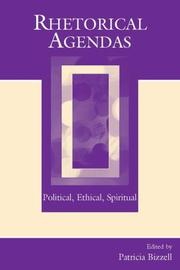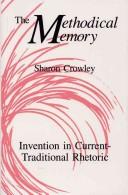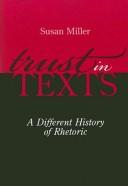| Listing 1 - 10 of 2840 | << page >> |
Sort by
|

ISBN: 1135604886 1135604894 128237544X 9786612375446 1410615685 9781410615688 9780805853100 0805853103 9780805853117 0805853111 9781135604899 9781135604844 1135604843 9781135604882 0805853103 0805853111 6612375442 Year: 2006 Publisher: Mahwah, N.J. Lawrence Erlbaum Associates
Abstract | Keywords | Export | Availability | Bookmark
 Loading...
Loading...Choose an application
- Reference Manager
- EndNote
- RefWorks (Direct export to RefWorks)
This edited collection offers a broad consideration of contemporary rhetorical scholarship, tied to political, ethical, and spiritual themes. Originating from the 2004 conference of the Rhetoric Society of America, the contents of this volume reflects the conference themes of rhetorical agendas in current theory and research. The volume starts off with transcripts of the talks presented by the conference's featured speakers. The essays that follow are organized around five key topics: history, theory, pedagogy, publics, and gender. These chapters address subjects ranging from religious identit
Book
ISBN: 9783110559552 3110559552 3110561190 9783110561197 Year: 2017 Publisher: Berlin Boston
Abstract | Keywords | Export | Availability | Bookmark
 Loading...
Loading...Choose an application
- Reference Manager
- EndNote
- RefWorks (Direct export to RefWorks)
The need for a new critical edition of Philip Melanchthon's philosophical works is particularly clear in the case of his writings on rhetoric. That Melanchthon played a central role in the transformation of the ancient discipline has been well established by historians. His writings on rhetoric have proven significant sources for several academic fields, including church history, Scriptural interpretation, the history of science, and the reception of classical literature. Remarkably, two of the three principal writings have not been published in their entirety since the sixteenth century. This volume collects critical editions of the three principal writings to provide a more complete record of Melanchthon's teaching of rhetoric. It includes critical editions of De Rhetorica (1519), Institutiones Rhetoricae (1521), and Elementa Rhetorices (1531). In addition to the three principal writings, this volume collects a new edition, based on a 1911 edition by Hanns Zwicker, of Dispositiones Rhetoricae (c. 1553), a manuscript compilation of 161 model themes. Scholars will find in this volume the major sources for Melanchthon's theory and practice of rhetorical instruction.
Book
ISBN: 1443892971 9781443892971 9781443890205 Year: 2016 Publisher: Newcastle upon Tyne, UK
Abstract | Keywords | Export | Availability | Bookmark
 Loading...
Loading...Choose an application
- Reference Manager
- EndNote
- RefWorks (Direct export to RefWorks)
This book arises from a symposium held in Oxford to consider the most fruitful trajectories of rhetoric in the 21st century. The gathering comprised an international delegation of leading scholars convened to assess-from an array of perspectives - the various possible futures of the ancient discipline of rhetoric as it responds vitally to the evolving contexts of the new millennium. This collection commemorates that event by extending its scrutiny into a number of specific fields of inquiry. It includes a foreword by Prof James J. Murphy, an introductory article by the editors, and six further
Book
ISBN: 9786557140499 Year: 2021 Publisher: [Place of publication not identified] : Fundação Editora da UNESP,
Abstract | Keywords | Export | Availability | Bookmark
 Loading...
Loading...Choose an application
- Reference Manager
- EndNote
- RefWorks (Direct export to RefWorks)
Se a história é a história das condições do poder, então a história é a história dos usos e abusos da retórica que sustenta o poder. A luta política talvez seja exclusivamente retórica e com isso a força seria apenas um complemento posterior, pois toda demonstração de força valeria apenas por seu efeito retórico de aumento, manutenção ou perda de poder". Ao formular nesses termos o problema da ordem (e da desordem) social, Ricardo Monteagudo nos faz entender que o tema da linguagem é, de fato, um lugar privilegiado para discutirmos a simbiose entre retórica e política na obra de J.-J. Rousseau. Tendo como pano de fundo um quadro histórico da retórica, dos autores da Antiguidade até Perelman e Todorov, a tese deste livro pode ser assim enunciada: no âmbito dos escritos políticos do filósofo genebrino, em particular no Discurso sobre a origem da desigualdade e no Contrato social, as condições de possibilidade das relações civis são estabelecidas, tanto para o bem quanto para o mal, pelo uso retórico da linguagem. Longe de se limitar a uma mera exegese acadêmica de textos datados, este trabalho se apresenta a nós, leitores do século XXI, como prova cabal de que certas investigações de Rousseau acerca do discurso político permanecem atualíssimas. Monteagudo se inscreve dessa maneira numa linhagem bibliográfica que, no Brasil, remonta às análises memoráveis de Bento Prado Jr. e Luiz Roberto Salinas Fortes sobre o assunto.
Periodical
Abstract | Keywords | Export | Availability | Bookmark
 Loading...
Loading...Choose an application
- Reference Manager
- EndNote
- RefWorks (Direct export to RefWorks)
Periodical
Year: 2011 Publisher: Buenos Aires, Argentina : Asociación Argentina de Retórica,
Abstract | Keywords | Export | Availability | Bookmark
 Loading...
Loading...Choose an application
- Reference Manager
- EndNote
- RefWorks (Direct export to RefWorks)
Book
ISBN: 1438494106 9781438494104 9781438494098 1438494092 Year: 2023 Publisher: Albany, NY
Abstract | Keywords | Export | Availability | Bookmark
 Loading...
Loading...Choose an application
- Reference Manager
- EndNote
- RefWorks (Direct export to RefWorks)
Breaks the spell of economic thought by interrogating the widespread language and logic of "incentives" in public life from a Lacanian perspective.
Book
ISBN: 0814100260 9780814100264 Year: 2020 Publisher: Champaign, Illinois
Abstract | Keywords | Export | Availability | Bookmark
 Loading...
Loading...Choose an application
- Reference Manager
- EndNote
- RefWorks (Direct export to RefWorks)

ISBN: 1280698136 9786613675095 0809385937 9780809385935 9781280698132 0809330016 9780809330010 0809316153 Year: 2010 Publisher: Carbondale, Ill. Southern Illinois University Press
Abstract | Keywords | Export | Availability | Bookmark
 Loading...
Loading...Choose an application
- Reference Manager
- EndNote
- RefWorks (Direct export to RefWorks)
In this first sustained critique of current-traditional rhetorical theory, Sharon Crowley uses a postmodern, deconstructive reading to reexamine the historical development of current-traditional rhetoric. She identifies it (as well as the British new rhetoric from which it developed) as a philosophy of language use that posits universal principles of mind and discourse. Crowley argues that these philosophies are not appropriate bases for the construction of rhetorical theories, much less guides for the teaching of composition.

ISBN: 0809387670 1435663535 9781435663534 9780809387670 9780809327881 0809327880 129982868X Year: 2008 Publisher: Carbondale Southern Illinois University Press
Abstract | Keywords | Export | Availability | Bookmark
 Loading...
Loading...Choose an application
- Reference Manager
- EndNote
- RefWorks (Direct export to RefWorks)
Trust in Texts: A Different History of Rhetoric challenges the accepted idea of a singular rhetorical tradition poorly maintained from the Athenian Golden Age until the present. Author Susan Miller argues that oratorical rhetoric is but one among many codes that guide the production of texts and proposes that emotion and trust are central to the motives and effects of rhetoric.This groundbreaking volume makes a case for historical rhetoric as disbursed, formal and informal lessons in persuasion that are codified as crafts that mediate between what is known and unknow
| Listing 1 - 10 of 2840 | << page >> |
Sort by
|

 Search
Search Feedback
Feedback About UniCat
About UniCat  Help
Help News
News